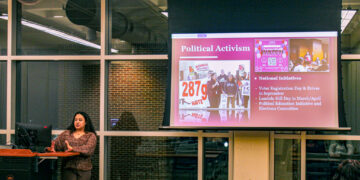Students and adults of all ages from across Mississippi packed into the Gertrude C. Ford Center on Monday night to welcome Grammy-award winning singer Renée Fleming, who was accompanied by pianist Robert Ainsley.
In a wonderful two-hour concert, the famed soprano ran the gamut of musical styles, compositions and even languages, from the likes of classical musicians such as Handel and Strauss, to the more contemporary stylings of Rodgers and Hammerstein.
The conclusion of every set garnered rapturous applause, with Fleming interstitially offering insights into the various works, both to provide historical context and to discuss the pieces in relation to her latest album, “Voice of Nature: The Anthropocene.”
Despite spectators arriving in droves, Fleming ironically began with “And the People Stayed Home,” a prose poem by Katherine O’Meara, which served as not only a great opener, but a salient examination of the past year in isolation.
The ballad, adapted by composer John Corigliano, required no instrumentation, beginning the evening on a collective note of subtlety and contemplation. The extraordinarily restrained style of the number was integral in bolstering Fleming’s main purpose for the overall performance, with themes of nature, romanticism and the purity of the natural world permeating every selection and performance within.
Fleming discussed how the pandemic forced her to truly experience the natural world, of which she had simply taken for granted, with these circumstances serving as the inspirational backbone for her latest album.
“Nature has been great to us, but we have not been so great to nature,” Fleming said.
Fleming then delved into numerous classical compositions, expressing a wide-range of tones and tempos, and fluctuating between English, French and German (with translations accompanying). Despite seemingly disparate genres and arrangements, the overall performance felt entirely assured and cohesive, with consistent direct and indirect ties to the aforementioned theme of nature.
Following intermission, Fleming continued on the classical trajectory with three pieces by Richard Strauss, where she received another round of ecstatic applause.
“Strauss is my desert island composer,” Fleming said.
The final stretch mainly skewed more contemporary, with works from Maria Schneider and Richard Rodgers. The final piece, “The Diva” by Andrew Lippa, was a wonderfully upbeat and self-reflexive musical number that allowed Fleming to appropriately poke fun at herself, garnering both laughs and applause, but applause in a different sense. The audience was encouraged to clap along, leading to a terrific sense of unity, and serving as a vital reminder of the beauty and power of live performance, thematically tying back into the opening song.
The electric atmosphere prompted Fleming and Ainsley back on stage twice more, concluding with an aria by Puccini and “I Could Have Danced All Night” from “My Fair Lady,” sending the audience off in a serenading sing-along, and prompting a cheerful, and highly deserved, standing ovation.
Fleming’s new album, “Voice of Nature: The Anthropocene,” will be released by Decca on Oct. 8.



























